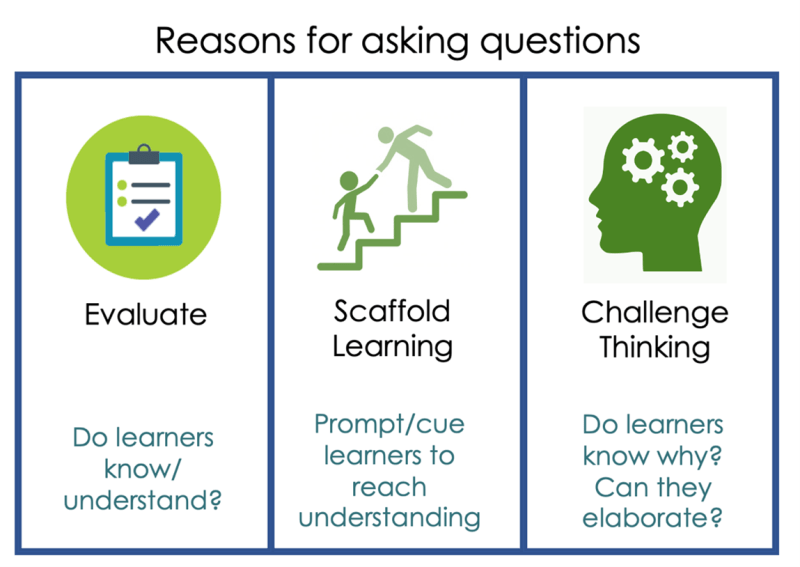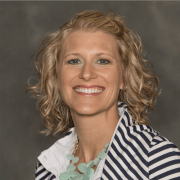Purposeful Questioning
MedEdPearls April 2023: How can purposeful questioning be leveraged to scaffold learning, evaluate student understanding, and challenge thinking while maintaining a supportive and engaging learning environment?
Purposeful questioning starts with understanding the reasons educators ask learners questions. There are three reasons educators ask questions 1) to scaffold learning, 2) to evaluate, or 3) to challenge thinking.

Scaffold Learning: Scaffolding is a dynamic process that requires the educator to be able to identify the knowledge gap faced by a learner and then offer support for the learner as they fill the gap and move toward a more advanced understanding. To do this well, the educator must have two ideas in mind: the learning objective and the learner’s current level of knowledge. Asking questions to scaffold learning in the clinical setting is often done in the moment through a give and take between the learner and educator.
Consider the following when designing questions:
- What do my learners already know about this topic?
- What do I want my learners to know about this topic when they leave?
- What questions can I ask that will help learners think and fill in knowledge gaps?
The trick is to ask questions that help learners access what they do know and build from there with further questions as guides. For example, in the following segment the medical educator uses questions to scaffold the learner to understand how bacterial middle ear infections occur:
- Educator – These microbiotas are common in the respiratory tract so why doesn’t everyone get an ear infection
- Learner – I don’t know…
- Educator – So think about it, why do we have a eustachian tube?
- Learner – To drain the ear.
- Educator - Yes to drain the middle ear. But what happens to this space once the eustachian tube gets blocked with fluid and pathogens?
At the start of that discussion, the learner is unable to answer the question asked. However, the medical educator scaffolds thinking to support learning to this next level.
Evaluate: Questioning is most often thought of as a way to assess or evaluate what learners know, and it is effective in doing so. It can be used to assess understanding, clinical skills, and reasoning to promote learner progress toward independence in the clinical setting. When educators have a clear understanding of what learners know and what they need to know (learning objectives), they can ask questions to help learners bridge knowledge gaps.
Challenge Thinking: Lastly, questions can be asked to challenge student thinking. When asking questions for the purpose of challenging, the educator might ask the learner to elaborate on their answer, ask if the learner knows why, or ask the learner how it might be different if a variable was changed. Still, caution must be used when asking learners challenging questions. It is important to explain to students the purpose(s) for asking the questions and to have already developed a safe learning environment.
When asking questions while teaching, your purpose for asking the question should align with the types of questions you are asking. Make sure you and your students understand your purpose for asking the question. Explicitly state, “I am asking you this question to challenge your thinking.”
For more tips on effective questioning check out Pylman and Ward 2020, Amin and Khoo 2003, or Kost and Chen 2015.
About the MedEdPearls Author

Stacey Pylman
PhD
- Director of Continuing Medical Education, Office of Medical Education Research and Development (OMERAD), Michigan State University College of Human Medicine
- Assistant Professor, Michigan State University College of Human Medicine
- Jean Bailey, PhD – Virginia Commonwealth University School of Medicine
- Carrie Bowler, EdD, MS, MLSCM (ASCP) – Mayo Clinic School of Continuous Professional Development
- Kristina Dzara, PhD, MMSc (Educators ’16; Assessment ’16; HCE 2.0 ’17) – Saint Louis University School of Medicine
- Shanu Gupta, MD, SFHM – University of South Florida Morsani College of Medicine and Tampa General Hospital
- Jennifer Hillyer, PhD – Northeast Ohio Medical University
- Larry Hurtubise, PhD, MA (HCE 2.0 '16) – The Ohio State University
- Anna Lama, EdD, MA – West Virginia University School of Medicine
- Machelle Linsenmeyer, EdD, NAOME (Assessment ’07) – West Virginia School of Osteopathic Medicine
- Skye McKennon, PharmD, BCPS, ACSM-GEI – Washington State University Elson S. Floyd College of Medicine
- Rachel Moquin, EdD, MA – Washington University School of Medicine
- Stacey Pylman, PhD – Michigan State University College of Human Medicine
- Leah Sheridan, PhD – Northeast Ohio Medical University
- Lonika Sood, MBBS, MHPE – Washington State University Elson S. Floyd College of Medicine
- Mark Terrell, EdD – Lake Erie College of Osteopathic Medicine
- Stacey Wahl, PhD – Virginia Commonwealth University School of Medicine
Harvard Macy Institute
Harvard Macy Institute
The Harvard Macy Institute educates, connects, and serves health care leaders around the globe by providing advanced faculty development programs, thought leadership, and impactful networking opportunities.
6 Programs

